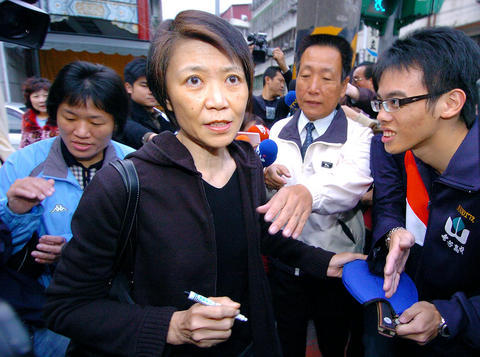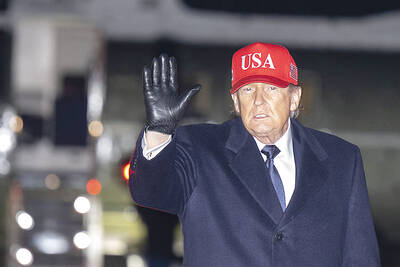Chow Mei-ching (
Frequently photographed in a black shirt and blue jeans with no makeup, Chow has shunned the limelight and insisted on going about her normal life ever since Ma entered politics.
Chow has worked as a lawyer for Mega International Commercial Bank for more than 20 years and seldom accompanied Ma to public functions.

Even after her husband won the presidency on March 22, Chow kept a low-profile and went to work by bus the following Monday.
"Please don't call me the president's wife. I am department director Chow," she told reporters who followed her onto the bus earlier last week, turning on her MP3 player and ignoring their inquiries.
On Tuesday, Chow said in a written statement that she would continue working as the head of the legal department of the government-controlled bank, defending her right to work amid debate over whether she should leave her job following her husband's inauguration on May 20.
"My work involves providing legal advice to the bank and does not include banking management, the company's operations or decision-making," Chow said in the statement. "It's impossible for me to be involved in the transfer of benefits."
Chow said she would consider leaving the bank if her work adversely affects the bank's reputation or its operations, or if her workload poses a negative impact on her duties as first lady.
Some political observers are not convinced, however, saying that by working for a state-run company, she was bound to run into situations where a conflict of interest may arise.
If Chow stays on the job after Ma is sworn in as president, she would be the first president's wife in Taiwan to have a separate career.
Ma's spokesman, Wang Yu-chi (
Married to one of the nation's most popular politicians, Chow has tried hard to avoid publicity and protect her privacy. Often confronted by a barrage of reporters and camera crews waiting in front of her apartment, she quietly goes her way, saying nothing but "thank you" to most questions.
Even when faced with allegations of insider trading and stealing newspapers while studying at Harvard, Chow defended herself only through written statements.
Unlike her public image of the poker-faced, "cool Mrs. Ma," Chow is a lovely approachable person in private, Wang said.
"Mrs. Ma is nothing like what you see on TV. She is friendly and thoughtful, and the campaign staff all like her a lot," he said.
Chen Yi-ling (
Chen recalled that during the campaign tour, Chow memorized all of the staff names on the first day and offered to help them with the luggage or prepare food for lunch and dinner.
"She was easygoing and attentive. I think she is more approachable than Mr. Ma," she said.
Although Chow did not stump for Ma until the final days of election campaign, she showed her support for her husband with her signature gesture: greeting voters by grasping both of their hands and doing a 90-degree bow.
Chen said Chow suffered from lower back pain but insisted on doing the 90-degree bow when greeting voters as a way to express her sincerity. However, some local cable news channels found fault with the gesture, saying Chow lacked sincerity because she did not look at people directly in the eyes when she shook hands with them.
As a lawyer, Chow has helped Ma prepare for debates during the two Taipei mayoral contests and the presidential race.
Ma expressed his gratitude for Chow's help before a mayoral debate when seeking a second term.
"However, sometimes she can be a tough sergeant," Ma said at the time, adding jokingly that "the biggest source of pressure for me is not my opponent, but my wife."
Commenting on Chow's decision to continue working while first lady, Shih Cheng-feng (
"She has ignored the fact that she is no longer an ordinary person. As the first lady, she should sacrifice her rights and focus her efforts on assisting the president," he said.
Women's rights groups agreed that Chow should avoid any potential conflict of interest, but extended their support for Chow to keep working while first lady.

Taiwan has received more than US$70 million in royalties as of the end of last year from developing the F-16V jet as countries worldwide purchase or upgrade to this popular model, government and military officials said on Saturday. Taiwan funded the development of the F-16V jet and ended up the sole investor as other countries withdrew from the program. Now the F-16V is increasingly popular and countries must pay Taiwan a percentage in royalties when they purchase new F-16V aircraft or upgrade older F-16 models. The next five years are expected to be the peak for these royalties, with Taiwan potentially earning

STAY IN YOUR LANE: As the US and Israel attack Iran, the ministry has warned China not to overstep by including Taiwanese citizens in its evacuation orders The Ministry of Foreign Affairs (MOFA) yesterday rebuked a statement by China’s embassy in Israel that it would evacuate Taiwanese holders of Chinese travel documents from Israel amid the latter’s escalating conflict with Iran. Tensions have risen across the Middle East in the wake of US and Israeli airstrikes on Iran beginning Saturday. China subsequently issued an evacuation notice for its citizens. In a news release, the Chinese embassy in Israel said holders of “Taiwan compatriot permits (台胞證)” issued to Taiwanese nationals by Chinese authorities for travel to China — could register for evacuation to Egypt. In Taipei, the ministry yesterday said Taiwan

‘LIKE-MINDED PARTNER’: Tako van Popta said it would be inappropriate to delay signing the deal with Taiwan because of China, adding he would promote the issue Canadian senators have stressed Taiwan’s importance for international trade and expressed enthusiasm for ensuring the Taiwan-Canada trade cooperation framework agreement is implemented this year. Representative to Canada Harry Tseng (曾厚仁) in an interview with the Central News Agency (CNA) said he was increasingly uneasy about Ottawa’s delays in signing the agreement, especially as Ottawa has warmed toward Beijing. There are “no negotiations left. Not only [is it] initialed, we have three versions of the text ready: English, French and Mandarin,” Tseng said. “That tells you how close we are to the final signature.” Tseng said that he hoped Canadian Prime Minister Mark Carney

The US’ joint strikes with Israel on Iran dismantled a key pillar of China’s regional strategy, removing an important piece in Beijing’s potential Taiwan Strait scenario, said Zineb Riboua, a senior researcher at the Hudson Institute’s Center for Middle East Peace and Security. In an article titled: “The Iran Question Is All About China,” Riboua said that understanding the Iran issue in the context of China’s “grand strategy” is essential to fully grasp the complexity of the situation. Beijing has spent billions of dollars over the years turning Iran into a “structural strategic asset,” diverting US military resources in the